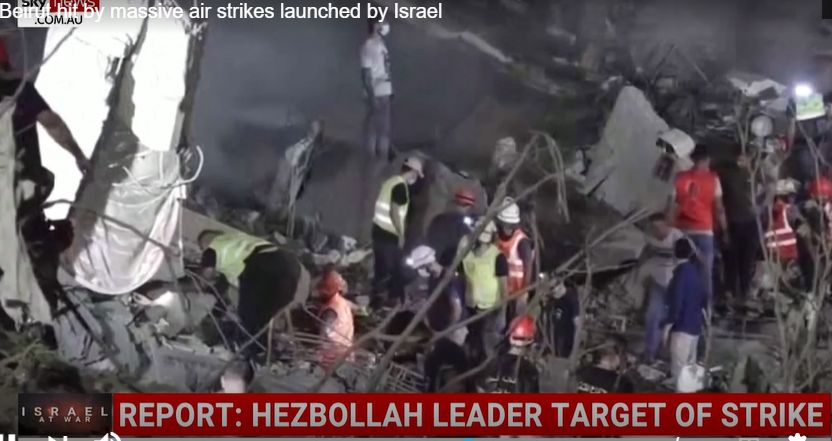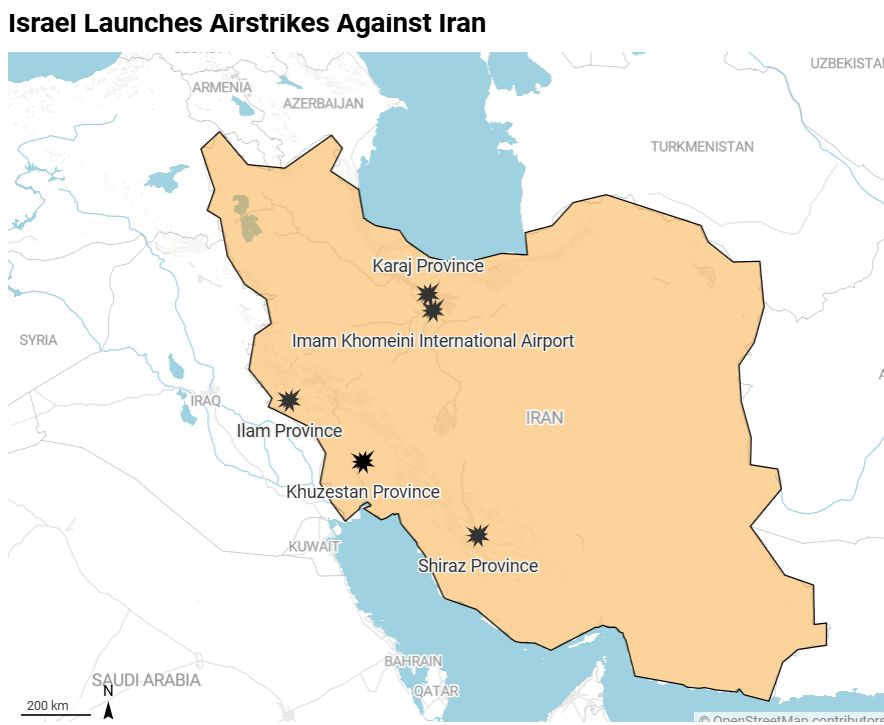Israel — Latest News since June 15th 2024
Go to latest news
Click here for prior news from January 10 2024
Click here to look at earlier maps (and events) over 4000 years of history for "Israel - Deep inside the plucky country".
October 2023
Israeli Prime Minister Benjamin Netanyahu said his country was at war with Hamas after the militant group’s forces poured across the border from Gaza on Saturday October 7, killing over 1,000 residents and capturing over 200 hostages.
News since June 15 2024
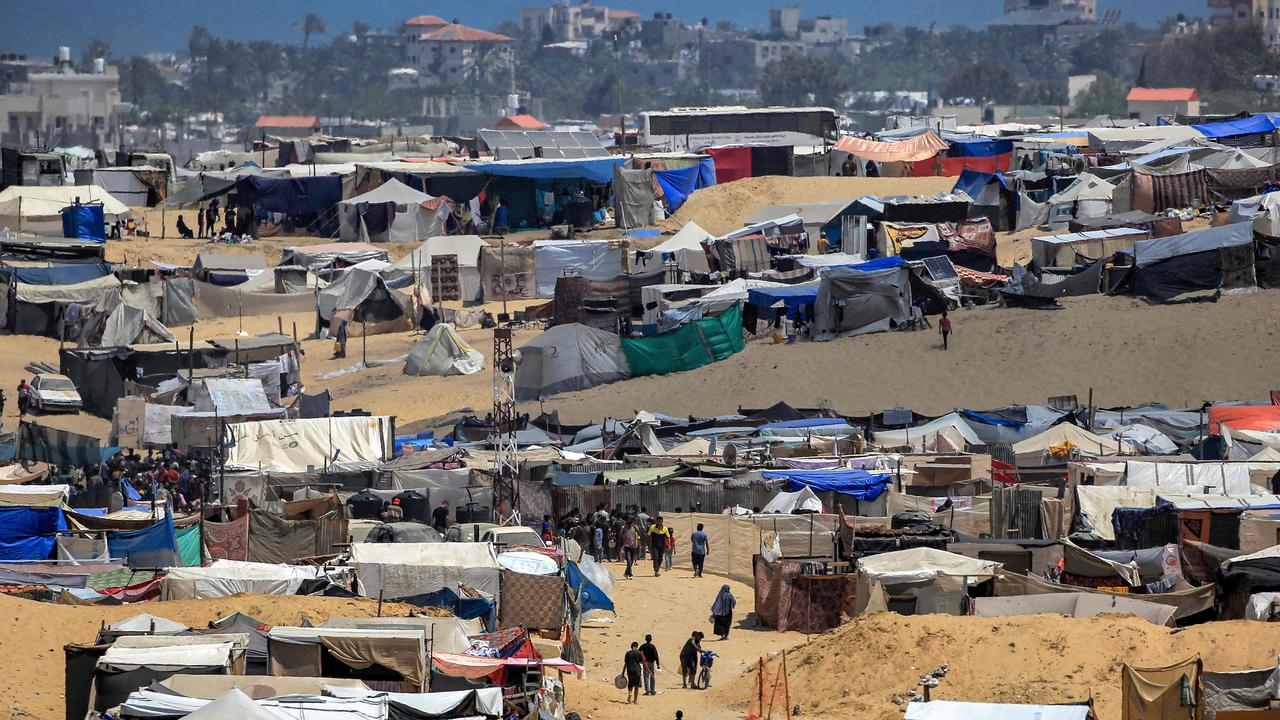
| |
Tents sheltering displaced Palestinians in Rafah in the southern Gaza Strip. Picture: AFP
| 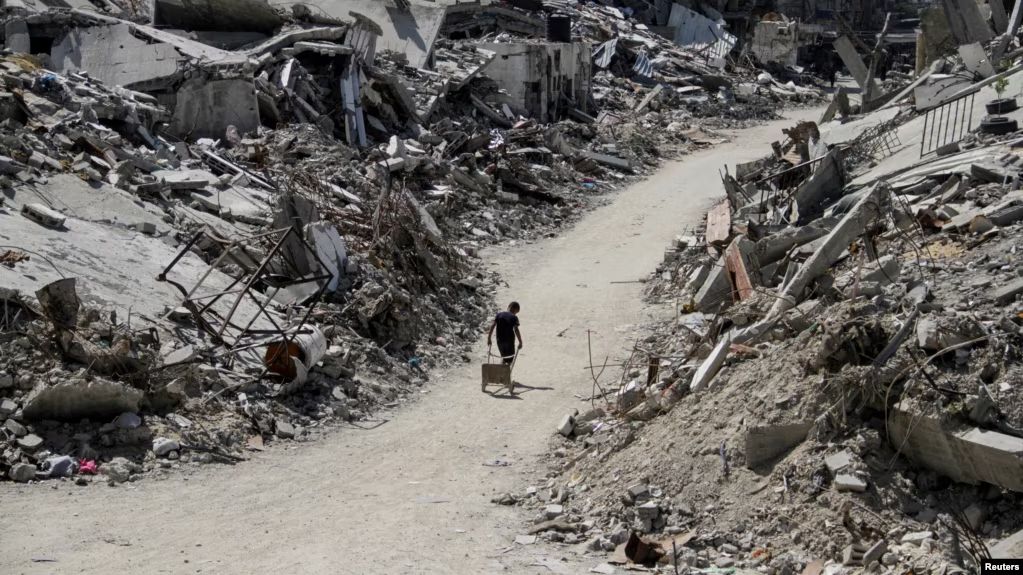
| |
A Palestinian walks among the rubble of damaged buildings, which were destroyed during Israel's military offensive, amid the ongoing conflict between Israel and Hamas, in Beit Lahia in the northern Gaza Strip, June 12, 2024.
|
|
Hamas losing support of Gazans
Weekend Australian
Fatima Abdulkarim, Dov Lieber and Abeer Ayyoub, WSJ
Saturday June 15 2024
Gaza’s war-weary population is growing increasingly frustrated with the fruitless cycles of ceasefire talks, as a new poll of Palestinians shows support for Hamas dwindling in the enclave. Months of diplomacy between Israel, Hamas and mediators from the US, Egypt and Qatar have failed to produce agreement even on the outline of a deal that would stop the fighting and free Israeli hostages in Gaza. The back and forth, as the death toll from the war mounts and the humanitarian situation in the Gaza Strip deteriorates, is fuelling unprecedented public discontent in Gaza with the militant group that seized power there almost two decades ago.
“Hamas drove the bus to the edge and lost control,” said Omaima Abu Eida, a 58-year-old Gaza resident. “They are not negotiating for us, they are negotiating to stay in power after all this devastation.” Fadi Awad, 32, an electrician and father of five living in a tent in central Gaza, said he was fed up with the negotiations and that Hamas was out of touch. “We hear positive talks, then pull back, then breakthrough, then it all falls apart and with it, our lives,” Awad said. “Our leaders, Hamas, the Arabs, they watch us on TV from their hotels,” he added. “[They] do not know what it’s like to run for your life, hungry and barefoot.”
Support for Hamas as rulers in Gaza has fallen to 46% from 52% over the past three months, according to a survey of more than 700 residents of the enclave. In the West Bank, the trend is reversed, with 71% of Palestinians surveyed supporting Hamas’s continued rule in Gaza, up from 64% in the previous poll, by the Palestinian Center for Policy and Survey Research. Hamas didn’t respond to a request for comment.
The Hamas military leader in Gaza, Yahya Sinwar, is calculating that more fighting and more Palestinian civilian deaths work to his advantage, messages he has sent to ceasefire mediators and Hamas colleagues show.
The survey took place at the end of May, before an Israeli operation to rescue four hostages left 274 Palestinians dead and 700 injured at the weekend, according to Palestinian health authorities. The Israeli military said about 100 Palestinians were killed or wounded, including Hamas militants and civilians caught in the crossfire. In response to the rescue operation, Hamas has hardened its negotiating stance, adding new terms that Israel can’t accept to an Israeli proposal presented by President Biden almost two weeks ago.
The militant group said in a statement late Wednesday that it had shown the “required positivity” to reach an agreement that “meets our people’s just demands, including a permanent ceasefire, complete withdrawal from the territory, return of displaced people, reconstruction and a serious prisoner exchange deal.” US national security adviser Jake Sullivan said Thursday that Hamas hadn’t accepted the proposal but instead had responded with an amended proposal. “Our goal is to figure out how we work to bridge the remaining gaps to get to a deal,” he told reporters ahead of the G-7 summit in Italy.
Israel and Hamas have haggled for months over fundamental differences in a familiar playbook that has ended each time in a collapse of talks. Hamas wants a permanent stop to the war and withdrawal of Israeli forces in exchange for the hostages it is holding in Gaza. Israel has said it won’t leave Hamas intact in the enclave and needs its hostages back before the war is declared over.
“People in Gaza have lost faith in Hamas, including many of the movement’s supporters. But people hate Israel more,” said a resident of the enclave. “Following Hamas’s latest response, there is now unprecedented discontent and frustration within Gaza,” Nazir Majali, an Israel-based analyst with Arabic newspaper Asharq Al-Awsat, said Thursday. “The population is increasingly critical of the movement’s leadership, describing its actions as unwise and irresponsible towards the suffering and pain of Gaza’s residents.”
Hamas has typically cracked down on public dissent in peacetime. But with Hamas personnel largely gone from the streets, public criticism of the group inside Gaza is growing, including on social media. At the same time, fear of retribution from Hamas for voicing criticism of the group is diminishing, locals say. Nu’man Hamouda, a 23-year-old accountant, said he has lost nine relatives, several friends, his job and home during the war. “If Hamas and Abbas heard our screams they will be the ones to end this now, unite and say they surrender,” he said, referring to Mahmoud Abbas, president of the Palestinian Authority.
Despite Hamas’s waning popularity in Gaza, the latest poll found that it is still by far the most popular Palestinian political party in Gaza and the West Bank. More than two thirds of those polled said they supported the Oct. 7 Hamas-led attacks on Israel. The researchers said that support for the attacks “does not necessarily mean support for Hamas and does not mean support for any killings or atrocities committed against civilians.” The backing comes from the belief among 80% of those questioned that the attacks brought global attention to the Palestinian cause, the researchers said.
The attackers from Gaza on Oct. 7 killed 1200 people in Israel, mostly civilians, according to Israeli authorities. The current level of public criticism of Hamas is unprecedented, stemming from the perception that Hamas is detached from the everyday suffering of Gazans, said Mkhaimar Abusada, associate professor of political science at Al-Azhar University in Gaza and now based in Cairo. While polls show Hamas continues to enjoy popularity among Palestinians in general who see the group as having revived their cause on the global stage, wartime polls don’t really capture the strength of feeling against Hamas among Gazans, Abusada said. “Maybe 80% of Palestinians in the West Bank and diaspora love Hamas, something that gave them honour or dignity, but for someone who lives in Gaza and is paying the price, it’s a totally different story,” he said.
Israeli Prime Minister Benjamin Netanyahu, who is seeking to preserve his coalition and drum up support in his cabinet for a deal, has said that Israel’s reading of the plan presented by Biden is that it would allow Israel to fulfil its goal of destroying Hamas’s government and military capabilities. Those statements have led Hamas and many in Israel to believe Netanyahu isn’t serious about the proposal, which Biden presented as leading to a permanent ceasefire.
An organisation representing a majority of families with relatives held hostage in Gaza said it saw Hamas’s recent response to the ceasefire proposal as a step toward the deal’s acceptance. Polls show a majority of Israelis prefer a deal to release hostages and end the war over continuing hostilities against Hamas.
In Gaza, according to the United Nations, over 1.7 million people are displaced and over a million are facing “catastrophic levels of food insecurity.” Much of the pre-existing healthcare system is either completely or partially out of service, and since early May, thousands of patients who need to be evacuated from the strip for emergency healthcare have been unable to leave, the U.N. said. More than 37,000 Palestinians have been killed in Gaza since the start of the war, most of them civilians, according to Palestinian health authorities. The figure doesn’t specify how many were combatants.
- Saleh al-Batati and Ken Thomas contributed to this article.
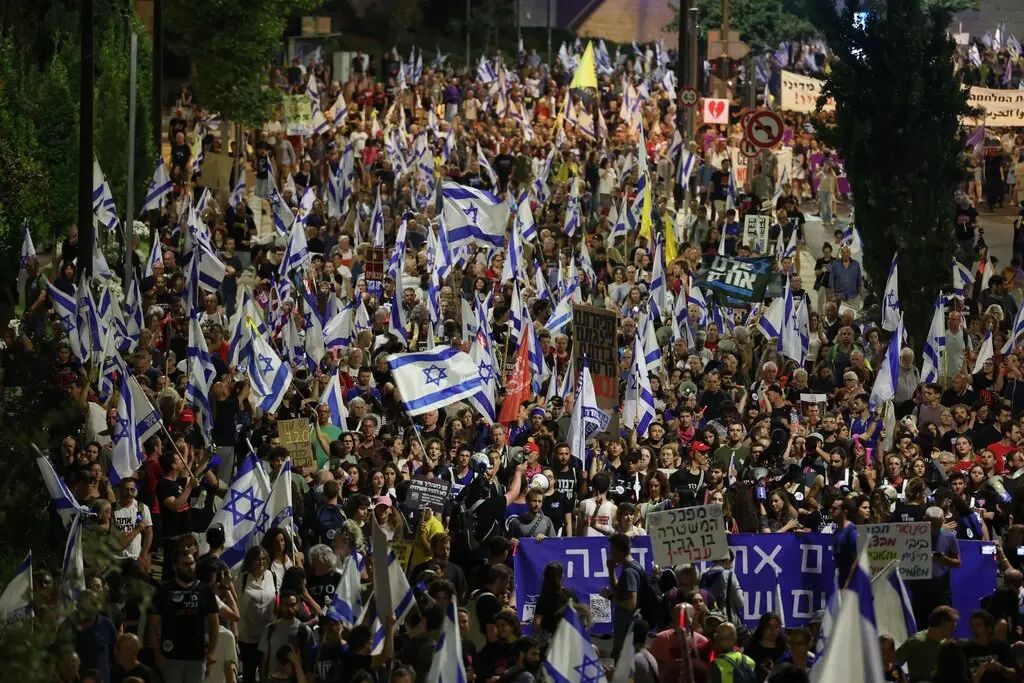
| |
Protesters gathered in front of the Knesset, Israel’s Parliament, on Monday, calling for elections and the immediate return of hostages captured in the Hamas-led attack on Oct 7. Credit Abir Sultan/EPA, via Shutterstock
|
Where Israel Said It Would Pause Fighting During the Day
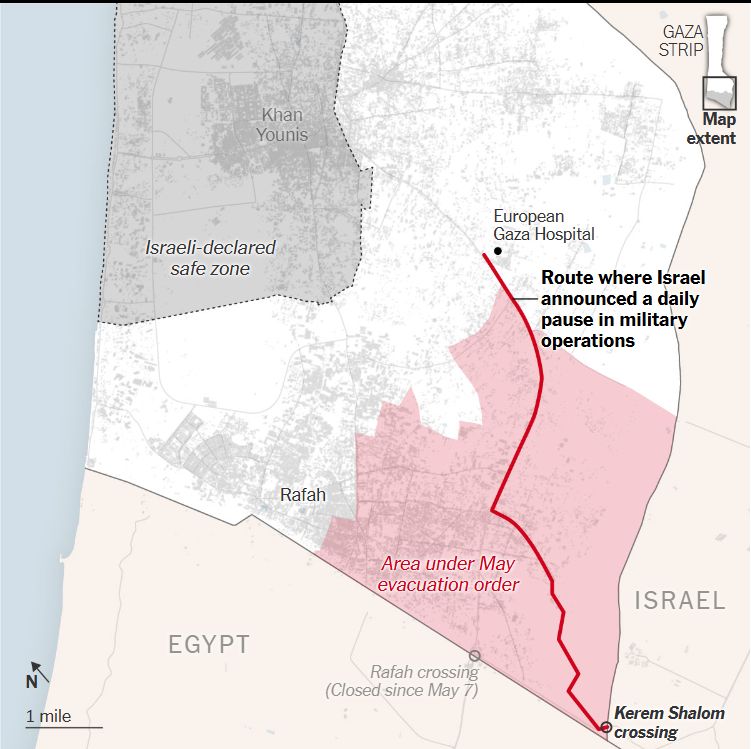
| |
Israel announced a new policy of avoiding daytime combat along a seven-mile route in eastern Rafah. The pause does not apply to central Gaza, where hundreds of thousands of Palestinians have fled. Source: Israeli military announcement By Leanne Abraham
|
|
Extract: Israeli Daytime Pause in Combat Appears to Take Hold in Gaza
New York Times
Patrick Kingsley and Adam Rasgon reporting from Jerusalem
Tuesday June 18 2024
Thousands of Israelis took to the streets of Jerusalem on Monday to call for elections and the immediate return of hostages held in Gaza in a demonstration that followed Prime Minister Benjamin Netanyahu’s recent decision to dissolve his war cabinet. Last week, two relatively moderate members resigned from the emergency war cabinet Mr Netanyahu formed in the wake of the Oct 7 Hamas-led assault on Israel, citing differences over the conduct of the war against Hamas in Gaza. Far-right members of Mr. Netanyahu’s coalition called on him to appoint them to the war cabinet, but on Sunday, the prime minister communicated to ministers at a wider cabinet meeting that he was dissolving the body instead.
The Israeli military said on Monday that it had paused operations during daylight hours in parts of southern Gaza, as a new policy announced a day earlier appeared to take hold amid cautious hopes that it would allow more aid to reach residents of the beleaguered territory. Aid workers said they hoped that the daily pause in the Israeli offensive would remove one of several obstacles to delivering aid to areas in central and southern Gaza from Kerem Shalom, an important border crossing between Israel and Gaza. Despite the pause, aid agencies warned that other restrictions on movement, as well as lawlessness in the territory, made food distribution difficult. The policy applies only to a seven-mile stretch of road in southern Gaza, and not to areas in central Gaza to which hundreds of thousands of displaced Palestinians have fled since the Rafah invasion began.
When Israel invaded Rafah in early May this year, the move led to the closure of the lone supply route between Egypt and Gaza, at Rafah, and it hindered aid groups’ ability to distribute food and other aid delivered from Israel and bound for southern and central Gaza. Though aid groups had stockpiled food and other supplies before the Israeli push into Rafah, six weeks of fighting there have prompted concerns about hunger in southern Gaza, even as fears of a famine ebbed in the territory’s north.
“Before Rafah, we had free access to Kerem Shalom basically all day, every day,” said Scott Anderson, the deputy Gaza director for UNRWA, the lead United Nations agency for Palestinians. “Now we still have access, it’s just a little more nuanced and difficult to get there,” he added, citing frequent gunfire and explosions in areas traversed by aid trucks, including three times recently when convoys recently came within roughly 100 yards of fighting. “What we had asked for was windows to access Kerem Shalom without having to coordinate so closely with the I.D.F. — to be able to come and go, and the trucks to come and go, with more freedom,” said Mr. Anderson, using the initials of the Israel Defense Forces.
That led to the new Israeli policy of avoiding combat in daylight hours.
The military said on Monday that it had killed more than 500 combatants in Rafah, severely reducing the capacity of two of Hamas’s four battalions in the city. The remaining two battalions were operating at a “medium level,” the military said. Though humanitarian groups welcomed the pause, they said that far more still needed to be done.
Israeli strikes have damaged supply routes in Gaza, hindering the passage of convoys, and crowds of desperate Gazans often intercept trucks in search of food. Cash shortages have prevented many civilians from buying food brought into Gaza by commercial convoys. And as summer approaches, there is a rising need for more clean drinking water, Mr. Anderson said.
In recent weeks, Israel has allowed aid groups far greater access to northern Gaza, where fears of famine were once highest, opening up more access points to the north. But aid groups say that sanitation and health care are still highly inadequate in northern Gaza, even if food supplies have improved.
“We were driving through rivers of sewage everywhere,” said Carl Skau, the deputy director of the World Food Program, an arm of the United Nations that distributes food in Gaza. “We really flooded the place with ready-to-eat food commodities,” he added. “But this progress needs to be sustained and frankly we need to diversify.”
Aaron Boxerman contributed reporting.
Netanyahu says intense fighting against Hamas is ending but war to go on
Reuters
Report by Ari Rabinovitch; Edit by Angus MacSwan
Sunday June 23 2024
JERUSALEM: Israeli Prime Minister Benjamin Netanyahu said on Sunday that the phase of intense fighting against Hamas in the Gaza Strip was coming to an end but that the war would not end until the Islamist group no longer controls the Palestinian enclave. Once the intense fighting is over in Gaza, Netanyahu said, Israel will be able to deploy more forces along the northern border with Lebanon, where fighting with Iran-backed Hezbollah has escalated.
"After the intense phase is finished, we will have the possibility to move part of the forces north. And we will do this. First and foremost for defensive purposes. And secondly, to bring our (evacuated) residents home," Netanyahu said in an interview with Israel's Channel 14. "If we can we will do this diplomatically. If not, we will do it another way. But we will bring (the residents) home," he said.
Many Israeli towns near the border with Lebanon have been evacuated during the fighting.
Asked when the phase of intense fighting against Hamas will come to an end, Netanyahu answered: "Very soon." But the military will still operate in Gaza. "I am not willing to end the war and leave Hamas as it is," he said.
Netanyahu also reiterated his rejection to the idea that the West Bank-based Palestinian Authority run Gaza in place of Hamas.
Israel’s Benjamin Netanyahu casts Gaza action as war on evil
Adam Creighton, The Australian
Thursday July 25, 2024
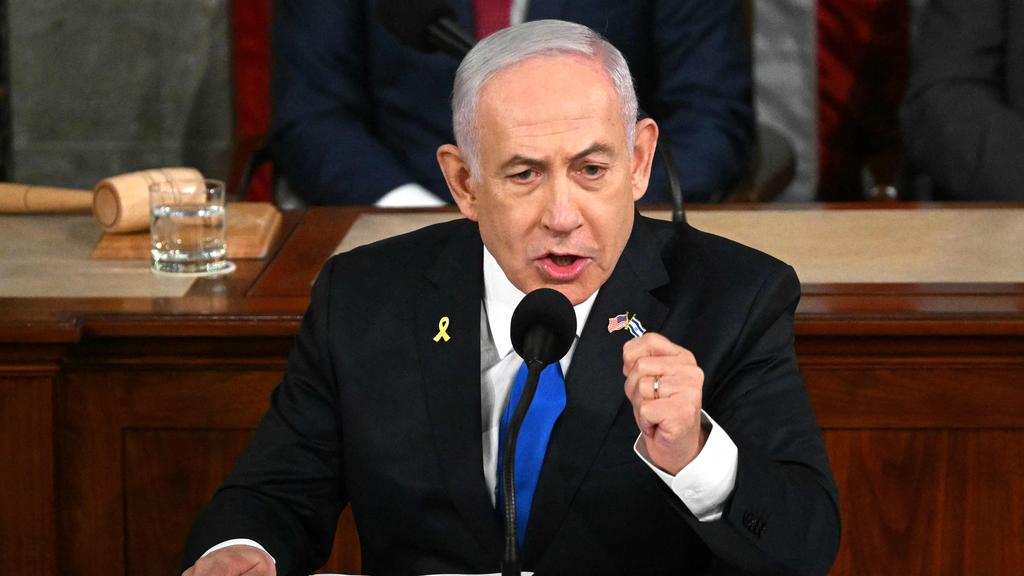
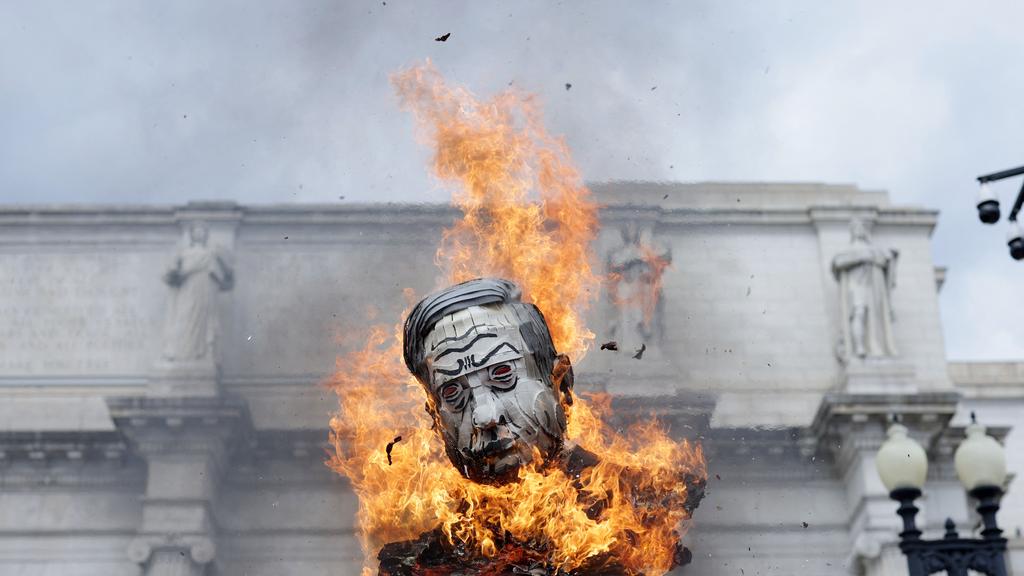
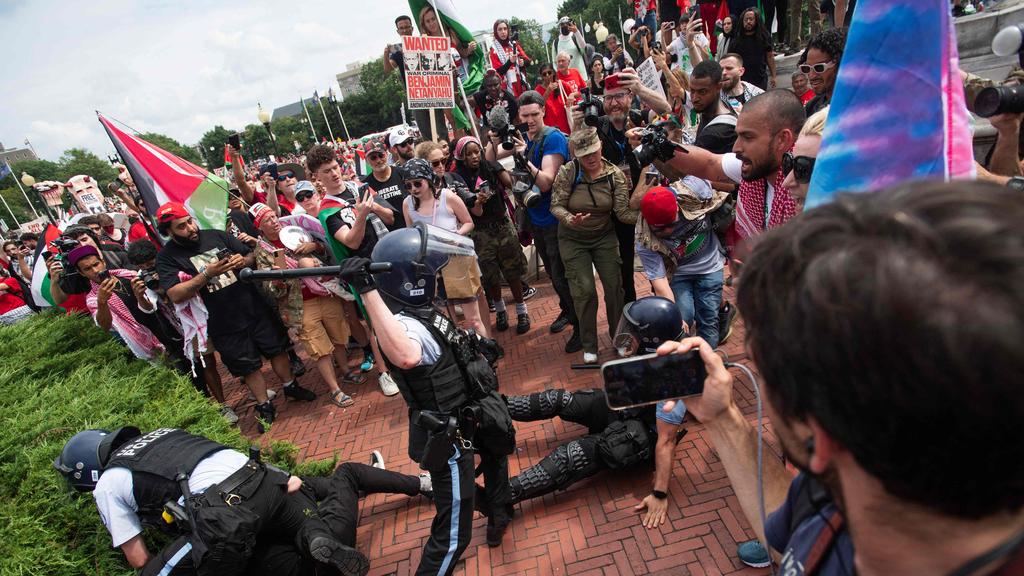
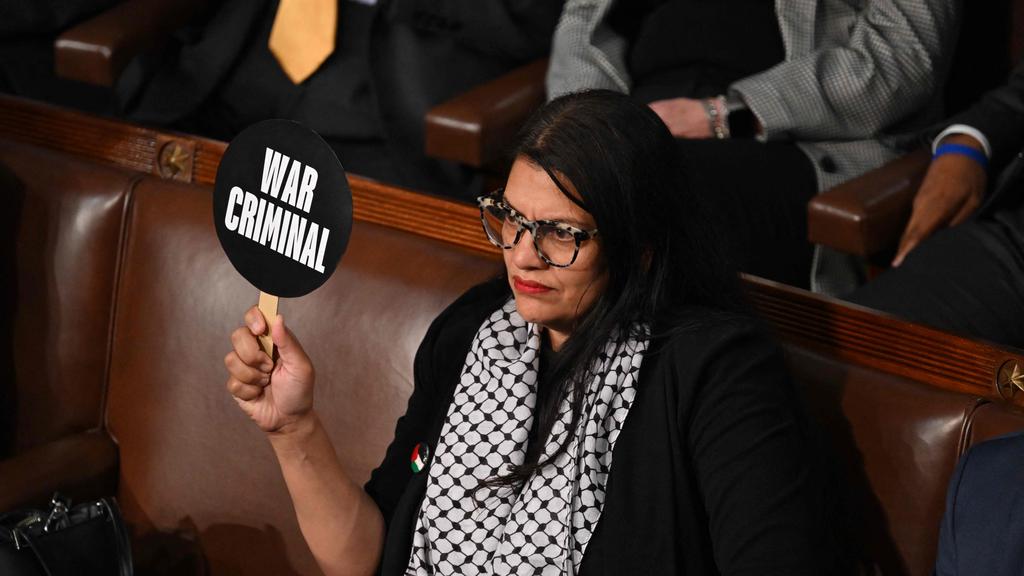
Clockwise from top: Benjamin Netanyahu addresses a joint sitting of congress on Wednesday. Rashida Tlaib, the only Palestinian-American member of congress, makes her views known; Pro-Palestinian protesters and police clash at Washington’s Union Station; and an effigy of the Israeli Prime Minister is torched near the US Capitol. AFP
Israeli Prime Minister Benjamin Netanyahu delivered a powerful and eloquent defence of his nation’s actions in Gaza before a largely rapt US congress on Wednesday (Thursday AEST), blasting the International Criminal Court, pro-Palestine protesters, and proposing a new NATO-like alliance to combat Iran. Ahead of planned meetings with Vice-President Kamala Harris, the Democratic Party’s presumptive presidential candidate, Joe Biden and Donald Trump, Mr Netanyahu cast the nine-month old bloody war, which Gazan authorities say has killed almost 40,000 people, as an existential battle between good and evil.
“In the Middle East, Iran and its axis of terror confront America, Israel and our Arab friends; this is not a clash of civilisations, it’s a clash between barbarism and civilisation,” he said. “For the forces of civilisation to triumph America and Israel must stand together, because when we stand together something very simple happens, we win, they lose,” he added, in a one- hour address than began at 2pm (4am Thursday AEST).
In a packed congressional chamber that gave several standing ovations and rounds of applause, Mr Netanyahu denounced critics of the Gaza campaign as “useful idiots” of Iran who were in effect siding with “evil, rapists and murderers”. “These protesters stand with them they should be ashamed of themselves,” he said, rattling off statistics to argue Israel was not starving Palestinians, and had produced the lowest ratio of combatants to non-combatants in the history of urban warfare.
Mr Netanyahu arrived in Washington two days earlier to a US polity in convulsions after President Joe Biden announced he would abandon his re-election campaign in favour of his deputy, Ms Harris, and a week after former president Donald Trump was almost killed in an assassination attempt. Dozens of Democrats were absent from the chamber, reflecting a deep rift within the ruling party over support for Israel, including Ms Harris, who pro-Israel forces worry would take a tougher line on the US military and financial support for Israel should she prevail in the November presidential election.
Mr Netanyahu’s widely anticipated speech, his fourth before what he called “the citadel of democracy”, included effusive praise for outgoing president Mr Biden and Mr Trump, whose successive administrations have provided critical financial support to Israel. “I know that America has our back … I thank you for it. All sides of the aisle. Thank you, my friends,” he said.
During the address, Representative Rashida Tlaib, the first Palestinian American in congress, held up a sign labelling Mr Netanyahu a “war criminal” and accusing him of “genocide.” Meanwhile, the atmosphere was charged outside the Capitol, with more than 5000 pro-Palestinian protesters making their presence felt.
Demonstrators clashed with police, who struggled to contain thousands of protesters. The scene was marked by fiery displays, including signs branding Mr Netanyahu a war criminal, the burning of effigies, and the defacement of statues with anti-Israel slogans such as “Hamas is coming”.
Former House of Representatives speaker Nancy Pelosi, another notable absentee from the speech, later blasted the Israeli leader on social media for allegedly refusing to engage in good-faith ceasefire talks with the terrorist group Hamas, which with fellow militants Palestinian Islamic Jihad, killed nearly 1200 people, mostly civilians, on October 7 last year. “This was by far the worst presentation of any foreign dignitary invited and honoured with the privilege of addressing the congress of the United States,” she said.
Mr Netanyahu, 74, in casting Iran as the ultimate source of instability in the Middle East, proposed an “Abraham Alliance” between Israel, the Middle East and potentially other Arab nations along the lines of NATO, which emerged after World War II to counter the Soviet threat. “If you remember one thing, one thing from this speech, remember this: Our enemies are your enemies,” Mr Netanyahu said. “Our fight is your fight. And our victory will be your victory.”
Amid growing criticism of how Israel has handled the war, Mr Netanyahu said Israel did not wish to resettle the Gaza Strip, hoping “a new Gaza could emerge” if Hamas were defeated and the currently Hamas-controlled strip “demilitarised and deradicalised”.
Wednesday’s address made Israel’s longest-serving prime minister the first foreign leader to address a joint meeting of congress four times – pulling ahead of Britain’s Winston Churchill.

| |
Sara Netanyahu, second right, wife of Mr Netanyahu, and released hostage Noa Argamani. Picture: Getty Images
|
|
Further Comment, Adam Creighton
“Don’t they know that the land of Israel is where Abraham and Isaac preached, where David and Solomon ruled,” he said. His claims were all disputed but it didn’t matter: he had the most powerful parliament in the world in thrall.
Echoing first the words spoken by Franklin Roosevelt after the Japanese attack on Pearl Harbor, Netanyahu then declared October 7 to be the equivalent of “9/11”, and was “a day that will live in infamy”. He movingly revealed he authorised the daring rescue of Noa Argamani, whose capture by Hamas terrorists became one of the most poignant images of that horrific day, and three other hostages, only after he met her dying mother, who told him she wished to hug her daughter one last time.
Pushing back against critics who cast Israel as an “apartheid state”, he had brave, gravely wounded Israeli soldiers in the audience stand up: an Ethiopian Jew who ran 13km to fight Hamas on that day, a Bedouin Muslim Israeli who lost his leg, and a tank commander who lost his arm and sight in one eye.
The only valid criticism of the speech might be the lack of a single mention of the various ceasefire proposals and peace deals the Biden administration has been furiously working on for months.
At 74, Netanyahu remains at the peak of his powers, however dim his electoral prospects back home. Even if he loses office over his handling of the war in Gaza, he will go down as the most influential Israeli politician since the nation’s founding in 1948.

| |
Ismail Haniyeh attends the inauguration of Irani's new President, Masoud Pezeshkian, in Tehran on Tuesday. Picture: Reuters
|
|
Nowhere to hide: Axis of Evil leaders hunted down
Cameron Stewart, The Australian
Thursday August 1 2024
Haniyeh died early Wednesday morning (local time)
One by one, Israel is picking off the terrorist leaders in Iran’s Axis of Evil.
In doing so, it is sending a chilling message to those who command Iran and its terror proxies like Hamas and Hezbollah that if they order the murder of innocent Israelis, there is nowhere to hide. One day, when they least expect it, an Israeli drone, an assassin’s bullet, or a bomb will have their name on it.
The brazen assassination of Hamas’ political leader Ismail Haniyeh in Tehran — the most senior Hamas leader to be killed since October 7 — came just a day after Israel said it killed Hezbollah’s most senior military official, Fuad Shukr, in a drone strike in Beirut. No-one should mourn the loss of these two killers.
Each of these men had directly ordered the deaths of innocent Israelis. Haniyeh was wanted by the International Criminal Court for his role in Hamas’ October 7 attack on Israel, including “extermination, murder, taking of hostages, rape and sexual assault in detention”.
Israel says Hezbollah’s Shukr was the commander responsible for the horrendous strike in the Golan Heights last weekend which killed 12 children and teenagers playing soccer. He was also wanted by the US for his role in the 1983 bombing attack that killed roughly 300 American and French soldiers in Beirut.
Targeted assassinations like these are notoriously difficult to carry out and they show how successful Israel’s intelligence network, including Mossad, have been in drawing targets on the backs of those responsible for October 7 and its aftermath. The death of Haniyeh was a coup in itself, but the manner of his killing — when he was among his fellow terror leaders in Tehran after attending the inauguration of Iran’s new president — was calculated to send the message to Iran and its proxies that no one is safe.
Just before he was killed in a ‘raid’ in Tehran the 62 year old Haniyeh was seen mingling with Hezbollah’s deputy leader Sheikh Naim Qassem and the leader of Palestinian Islamic Jihad, Ziyad Al-Nakhalah. He also had a face-to-face meeting with Iran’s new president Masoud Pezeshkian and its supreme leader, Ayatollah Ali Khamenei. The fact that Haniyeh was then assassinated in the same city, among them all, will surely make the others wonder if they could be next.
The death of Haniyeh is a major blow to Hamas, because he was the international face of the terror group and was the leading negotiator in the deliberations with Israel over the plan for a ceasefire and the release of Israeli hostages in Gaza. It was Haniyeh who had repeatedly delayed these negotiations with absurd demands and it was he who was primarily responsible for the repeated failure to strike a deal.
Under the secretive and complex leadership structure of Hamas, Haniyeh was one of the group’s three top commanders. The others, who are also wanted by the ICC for war crimes are Hamas’s military leader, Muhammad Deif, and its leader in Gaza, Yahya Sinwar. Israel attempted to kill Deif in Gaza earlier this month and although Hamas claims he survived the bombing, his fate remains unclear.
Haniyeh was close to the spiritual founder of Hamas in Gaza in 1973, Sheikh Yassin (1936-2004), and rose through the ranks of the organisation, first becoming leader in Gaza, before taking on overall leadership of the group’s political wing in 2017. His death has further complicated hopes for an agreement on a ceasefire and hostage deal between Israel and Hamas, brokered by third parties in Qatar.
Haniyeh’s assassination will not be the end of Hamas, there are always new leaders to take his place, and it may not make the terror group any more likely to put down its arms. But it does send the message that those Hamas leaders who sanction the killing of innocent Israelis and support using Palestinian civilians in Gaza as human shields, will pay a price for their murderous behaviour.
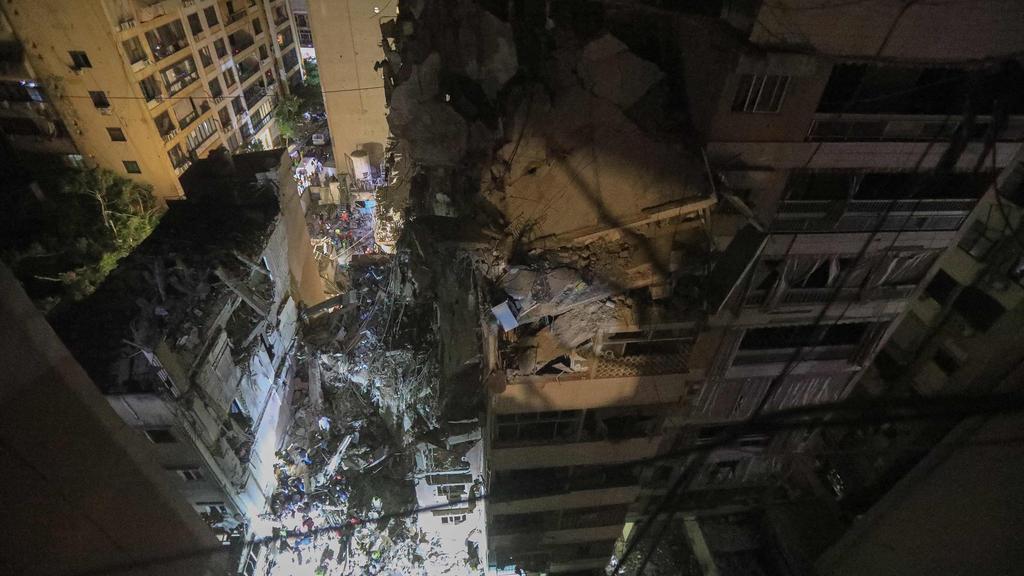
| |
The destroyed top floors of an eight storey building targeted by the IDF. Picture: AFP
|
|
Same Day
Extract
IDF takes out Hezbollah chief
Jared Malsin, Adam Chamseddine, The Wall Street Journal
BEIRUT—Israel said it killed one of Hezbollah’s top military leaders in an airstrike in Beirut intended as retaliation for a Saturday attack on the Israel-controlled Golan Heights that killed 12 young people, a response that came amid fears of a widening war in the Middle East. The strike on Fuad Shukr, the highest-ranking leader of the group to be killed in years, risks sharply escalating tensions between Hezbollah and Israel. Hezbollah didn’t immediately say whether Shukr had died in the strike.
The Israeli strike comes at a dangerous moment in Israel’s nine-month conflict with Hamas in the Gaza Strip, following that group’s Oct. 7 attacks in southern Israel. During the conflict, Israel and Hezbollah have regularly exchanged fire across the Israel-Lebanon border, and the strike on Tuesday was the second time during the war that Israel has targeted Beirut, the Lebanese capital. An Israeli airstrike killed a senior Hamas leader in Beirut in January.
The strike also killed three civilians including a woman, a girl, and a boy, and wounded 74 others, according to the Lebanese health ministry. First responders who rushed to the scene transported the wounded to Beirut hospitals. The Israeli military announced Shukr’s killing. “While we prefer to resolve hostilities without a wider war, the IDF is fully prepared for any scenario,” Israeli military spokesman Daniel Hagari said, referring to the Israel Defense Forces. The Israeli military called the attack “a targeted strike in Beirut, on the commander responsible for the murder of the children” in the Golan Heights and other Israeli civilians. “Hezbollah crossed the red line,” Israeli Defense Minister Yoav Gallant said in a social-media post after the strike.
Shukr was previously sanctioned and designated a terrorist by the US government. He played a role in the 1983 bombing of the US Marine Corps barracks in Beirut that killed 241 American personnel, and aided Hezbollah forces fighting rebels in Syria, according to a Justice Department notice offering a $5 million reward for information about him.
The strike, just before sunset on Tuesday (local time) produced an explosion in the Haret Hreik neighborhood in Beirut’s southern suburbs where Hezbollah has broad influence, according to Lebanon’s official National News Agency. The wailing of sirens could be heard miles from the blast. Young men wearing surgical masks stood at barricades blocking access to area hospitals.
Lebanon’s prime minister, Najib Mikati, denounced the strike, saying, “This criminal act that took place tonight is one in a series of aggressive operations that are killing civilians in clear and explicit violation of international law.”
Israel and the US have accused the Iran-backed Hezbollah of carrying out Saturday’s strike in Majdal Shams, a community of the Druze religious minority, which also wounded about 40 people. Hezbollah said it had nothing to do with the deaths in Majdal Shams, but claimed responsibility for other attacks in the area on the same day, including launching a rocket at an Israeli military site a few miles from the strike scene.
While all sides have indicated they aren’t interested in an all-out war, the continuing fighting and Tuesday’s strike raise the risk of a miscalculation that could result in a wider conflict. Before Tuesday’s strike, the Biden administration had scrambled to calm tensions following the Golan Heights attack, hoping for an Israeli response that would send a strong signal to Hezbollah but not spark a wider war. US officials had reached out to their counterparts in Israel and Lebanon, as well as other Arab countries, and traded indirect messages with Iran to try to de-escalate the situation, said Arab and European officials familiar with the matter.
A US official said Israel gave Washington indications ahead of time about the strike, including the location, the fact that it would target a person and that it would be “limited in scope.” Hagari, the Israeli military spokesman, said the Israeli armed forces had been in continuous dialogue with the US, including the American military’s Central Command, “from the start of the war and certainly tonight.”
The Lebanese government had communicated that a strike on Beirut would cross a red line, and diplomats trying to avoid a wider conflict worried that the situation would escalate after the Israeli strike. The challenge facing Israel before Tuesday’s strike was to calibrate a response that would punish Hezbollah and satisfy the Israeli public, while avoiding crossing a line that would lead to full-scale war on an additional front, amid the war in Gaza. Fighting between Israel and Hezbollah had continued earlier Tuesday, and an Israeli man was killed as a result of a strike on northern Israel.
Any full-blown war between Israel and Hezbollah could come at a high cost to both sides in terms of death and destruction. During their previous war, in 2006, Israel bombed Beirut’s civilian airport and other infrastructure.
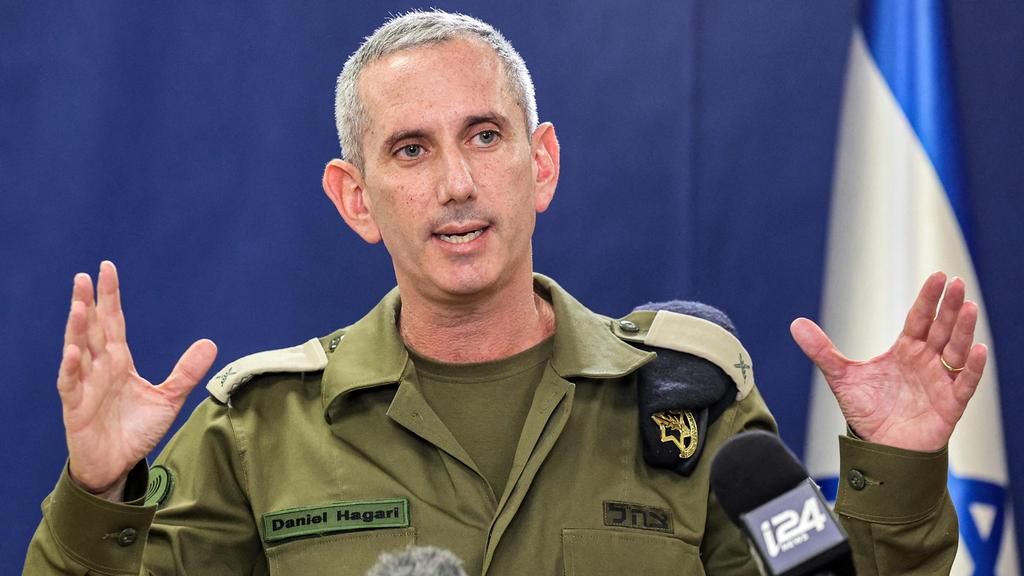
| |
Israeli army spokesman Daniel Hagari speaks to reporters. Picture: AFP.
|
|
Israel military on ‘peak alert’ as US warns of imminent attack
Staff writers and agencies, The Australian
With AFP
Tuesday August 13 2024
Israel has put its military on “peak alert” amid reports Iran could attack Israel within the next 24 hours.
The Israeli Defence Forces moved to high alert for the first time this month after observing preparations by Iran and Hezbollah to launch a strike, the Wall St Journal reports, while Middle East sources told Fox News the strike could come in hours. The White House says it shares Jerusalem’s assessment that Iran could launch a “significant” attack this week.
“We have to be prepared for what could be a significant set of attacks,” National Security Council spokesman John Kirby told reporters. “We share the same concerns and expectations that our Israeli counterparts have with respect to potential timing here – could be this week,” he added.
In Israel, IDF spokesman Daniel Hagari said the Israeli Air Force has increased its patrols over Lebanon, “to detect and intercept threats. We view the statements of our enemies seriously, and are therefore prepared at the highest level of readiness for defence and attack,” he said.
“We are in the days of vigilance and readiness, the threats from Tehran and Beirut may materialise and it is important to explain to everyone that readiness, preparedness and vigilance are not synonyms for fear and panic,” said Yoav Gallant, Israel’s Defence Minister.
US President Joe Biden and the leaders of France, Germany, Italy and Britain urged Iran to “stand down” its threats of an attack. “We called on Iran to stand down its ongoing threats of a military attack against Israel and discussed the serious consequences for regional security should such an attack take place,” the leaders said in a statement.
Hezbollah has fired dozens of rockets from Lebanon into northern Israel, calling it retaliation for Israeli attacks last week.
However Iranian President Masoud Pezeshkian has continued to insist his country has “the right to respond” to any aggression, after the killings of Hamas political chief Ismail Haniyeh and Hezbollah commander Fuad Shukr.
After German Chancellor Olaf Scholz urged de-escalation in a phone call with the Iranian leader, Mr Pezeshkian said: “While emphasising diplomatic solutions to issues, Iran will never give in to pressure, to sanctions and to bullying and considers it has the right to respond to aggressors in accordance with international norms,” according to a statement published by official news agency IRNA.
Speculation grew over the weekend that an attack from either Iran or Hezbollah would come on Tisha B’av, an annual fast day in Israel on which Jews commemorate the destruction of two temples by the Babylonian and Roman empires. An attack on Tisha B’av, which falls today, would be of symbolic significance to Israel’s major regional enemy.
US Central Command announced on Monday (AEST) the US is rushing an aircraft carrier strike group and a guided missile submarine to the region with US Defence Secretary Lloyd Austin telling Mr Gallant he had ordered the USS Abraham Lincoln Carrier Strike Group, which is equipped with F-35C jet fighters, to move more quickly to the region, where it would add to the capabilities of the USS Theodore Roosevelt Carrier Strike Group already in the Middle East.
Meanwhile Saudi Arabia and Jordan have reiterated their warning that Tehran must not use their airspace to launch an attack, advising that they will shoot down any “foreign objects” to pass through.
It came amid a growing rift in Israel’s cabinet, with Benjamin Netanyahu accusing Mr Gallant of using “anti-Israel narrative” as the Israeli news media reported Mr Gallant disparaged Netanyahu’s goal of “total victory” over Hamas as “gibberish”.
After the Ynet news website reported Mr Gallant’s remarks, the Prime Minister’s office said in a statement: “When Gallant adopts the anti-Israel narrative, he harms the chances of reaching a hostage release deal. Israel has only one choice: To achieve total victory, which means eliminating Hamas’s military and governing capabilities, and releasing our hostages. This victory will be achieved.”
In an apparent attempt to ease tensions with Mr Netanyahu, Mr Gallant attacked the leak from what had been a closed-door meeting. Mr Gallant posted on social media: “One of the main vulnerabilities revealed in the war, against which we must act with full force, are the incessant leaks from sensitive and classified meetings,” he said. “During a security briefing I gave today to the Foreign Affairs and Defense Committee, I emphasized I was determined to achieve the war’s goals and continue fighting until Hamas is dismantled and the hostages are returned,” he said. It has been reported recently that the rifts between the two men are so great Mr Netanyahu is considering firing Mr Gallant. However the New York Times reports that this is not currently on the agenda.
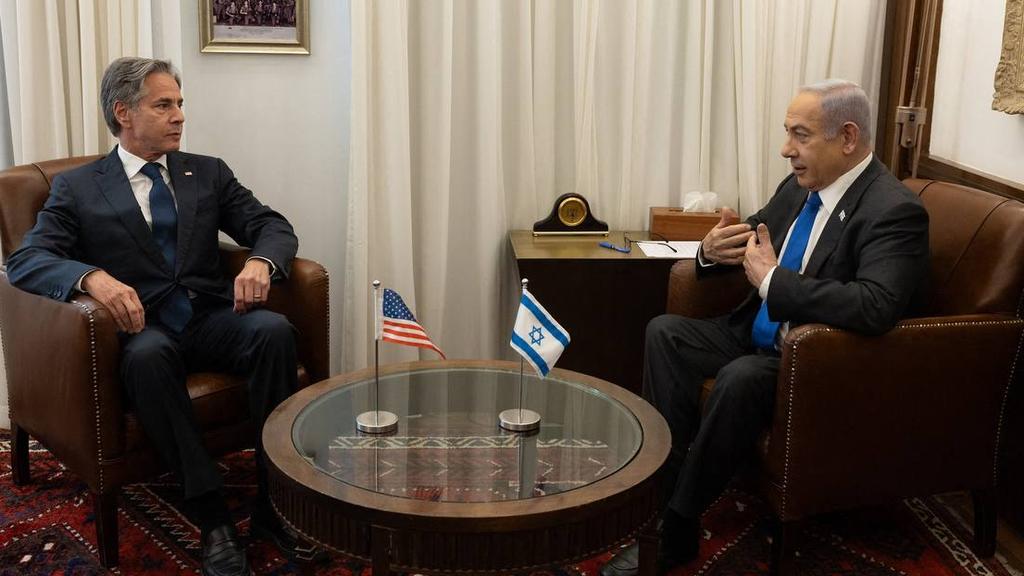
| |
US Secretary of State Antony Blinken held a three-hour meeting with Israeli Prime Minister Benjamin Netanyahu. Picture: AFP.
|
|
Netanyahu casts doubt on truce as Israel retrieves six dead hostages
AFP
Wednesday August 21 2024
US Secretary of State, Anthony Blinken met with Israeli PM Benjamin Netanyahu on Monday, saying Israeli Prime Minister Benjamin Netanyahu had agreed to an American "bridging proposal" for a ceasefire deal in Gaza. It is now up to Hamas to agree, Mr Blinken added.
The pair met in Tel Aviv for talks that Mr Netanyahu has described as "positive", with his office adding that he had reiterated his commitment to an American proposal on the release of the hostages still held by Hamas, which took into account Israel’s security needs.
Update, next day
Hamas is expected to reject the ceasefire deal with Israel proposed by the US, as the families of hostages held in Gaza have reportedly been sent threatening messages from the phones of their loved ones. Hamas leader Yahya Sinwar has received the proposals, but Israeli media reports that Jerusalem expects him to stick to the Hamas line and turn the truce down.
It comes amid reports that Hamas has threatened to kill the hostages unless their families “fight the government,” and has demanded ransoms for their safety. Some of the messages read: “If you don’t fight the government, you won’t see your loved ones return,” Channel 12 reports.
Israel’s intelligence services have warned the threats either come from Hamas or Iranian sources.
Israel’s prime minister, Benjamin Netanyahu, has also cast doubt on the prospect of a truce with Hamas as he met the grieving families of six hostages whose bodies were retrieved from Gaza by the Israeli military.
After speaking with US Secretary of State Antony Blinken on Monday, Mr Netanyahu stressed to victims groups that he would not budge on red lines, particularly Israel’s control over the Philadelphi Corridor between Gaza and Egypt. “I am not sure that there will be a [hostage] deal,” Mr Netanyahu said according to a statement put out by victims groups. “If there is a deal, it will be one that safeguards those [Israeli] interests which I have repeatedly stressed, which is preserving Israel’s strategic assets,” he said.
Earlier, the Israeli Defence Forces recovered the hostages’ bodies from Gaza’s southern area of Khan Younis. Following intelligence and forensic analysis, the families of the dead hostages had been informed, the military said, without giving details of the operation in Khan Younis.
The recovery of the bodies, in a joint operation between the army and the internal security agency Shin Bet, provided the hostages’ families “with necessary closure and grants eternal rest to the murdered”, the Hostages and Missing Families Forum said. The campaign group called on the Israeli government to ensure that the remaining hostages were also returned to Israel in a negotiated deal.
Mediators Egypt, Qatar and the US are urging Israel and Hamas to agree a ceasefire deal that would help secure the release of remaining hostages in exchange for Palestinian prisoners held in Israeli jails. The hostages were Yagev Buchshtab, Alexander Dancyg, Yoram Metzger, Nadav Popplewell, Chaim Perry, previously announced dead, and Avraham Munder, whose kibbutz of Nir Oz near Gaza announced his death earlier on Tuesday.
Among the six bodies released, Metzger, Perry and Dancyg also hailed from Nir Oz, a community near Gaza that was particularly hard hit by the October 7 attack by Hamas on southern Israel. Palestinian militants abducted Munder, his wife, daughter and grandson that day. The other family members were released during the single, week-long truce of the war last November, while his son was killed on the day of the attack. Of 251 people taken hostage that day, 105 are still being held hostage inside the Gaza Strip, including 34 the military says are dead.
Israel’s retaliatory military campaign has killed 40,173 Palestinians in Gaza, according to the Hamas-run territory’s health ministry, which does not give details of civilian and militant deaths. Most of the dead in Gaza are women and children according to the UN.
Hopes for a negotiated truce rose slightly on Monday when Israeli Prime Minister Benjamin Netanyahu publicly endorsed a US “bridging proposal” to finalise a hostage deal with Hamas, as the militants took responsibility for a failed suicide attack in Tel Aviv.
After a three-hour meeting with US Secretary of State Antony Blinken in Jerusalem, Mr Netanyahu released a statement backing the proposal for a ceasefire that was presented to Israel and conveyed to Hamas at the end of talks in Doha last week. It was the first time Mr Netanyahu had publicly supported the proposal. “The Prime Minister reiterated Israel’s commitment to the current American proposal on the release of our hostages, which takes into account Israel’s security needs, which he strongly insists on,” the Prime Minister’s Office said.
Mr Blinken earlier announced that Israel had accepted the truce proposal and pressured Hamas to do the same, having earlier said the talks may be the “last opportunity” for a ceasefire. “He supports it. It’s now incumbent on Hamas to do the same,” Mr Blinken said in Tel Aviv on his ninth visit to the Middle East since October 7.
Hamas has rejected the proposal and, referring to a bombing attempt in Tel Aviv on Sunday as a “martyrdom operation” – a term for a suicide attack – said more such attacks would come as long as the war continued. A Palestinian was killed by a powerful explosion when a bomb the person was carrying went off.
Washington put forward the proposal last week after the most recent round of talks in Qatar.
The terrorist group on Sunday said the bridging proposal “responds to Netanyahu’s conditions” and leaves him “fully responsible for thwarting the efforts of the mediators”.
Mr Blinken visited Egypt and Qatar before returning to the US on Wednesday.
Neutering a terrorist army
Worthy of Bond, this recasts war on terror
Cameron Stewart, The Australian
Thursday September 19 2024
The explosions of thousands of the Hezbollah-issued pagers about 3.30pm (10.30pm AEST) on Tuesday caused mayhem around Lebanon as those carrying the devices fell to the ground, suffering grievous wounds and burns mostly to the groin, hands and face. Eleven people were reported dead with at least 2800 injured, More than 300 of those were said to be in a critical condition.
The devices blew up several seconds after they received a message purported to be from Hezbollah, maximising the damage as many people were trying to look at the incoming message when the pagers exploded. The Hezbollah members were struck down en masse across the country, in marketplaces, on motorbikes and in homes, causing hospitals to be flooded with thousands of badly wounded men.
Israel’s spy agency Mossad is reported to have planted explosives inside about 5000 pagers that Hezbollah imported months ago. Most of the victims were from Hezbollah strongholds in southern Beirut and in the Bekaa region of eastern Lebanon. Some explosions were also reported from Hezbollah proxies in Syria and Iraq. Iran’s ambassador to Lebanon, Mojtaba Amani lost an eye when his pager exploded.
Israel did not admit liability for the attack, but Mossad was reportedly behind the plot, which involved the interception by Israeli agents of a new large batch of pagers ordered earlier this year by Hezbollah. Taiwanese firm Gold Apollo was reported to have manufactured the pagers, but the firm denied this, saying the pagers were made by a Hungarian firm with which it signed a deal. Small amounts of explosives along with a detonator were inserted into the pagers by Mossad allowing them to be detonated remotely and en masse.
Commentary
Israel has speared Hezbollah through the heart with its James Bond style exploding pager assault on its fighters, greatly weakening the terror group’s ability to strike back and provoke a broader war in the Middle East.
Israel’s pager attack on Hezbollah was one of the most astonishing and devastating intelligence attacks in history, not only dealing a savage blow to the militant group but also sending a chilling message to the terror puppet master Iran. The attack on about 3000 Hezbollah members across Lebanon was so outrageous and unexpected that it could have come from a Bond movie or a science-fiction novel rather than real life.
From Israel’s perspective, the attack appears to have been Mossad’s finest hour. The Israeli intelligence service appears to have secretly intercepted a new batch of pagers ordered by Hezbollah and inserted explosives into each one, to be detonated remotely and en masse. Ironically, the pagers were only ordered because Hezbollah deemed mobile phones to be too easily compromised by Mossad.
The genius of such an attack, from Israel’s perspective, was that because the pagers were only handed out to Hezbollah members, the vast majority of those injured by the exploding pagers were directly linked to the terror group, with minimal innocent lives lost. As such, the pager attack is likely to do more damage to Hezbollah than anything we have seen previously because it has disabled thousands of its fighters while destroying the ability of the group to communicate and plot new attacks.
It came at a powder-keg moment when tensions between Hezbollah at Israel were already at the highest since October 7 last year, with both sides locked into a low level war while trying to avoid an all-out conflict. The attack – which was clearly months in the planning – was timed to coincide with a stated push by Israel to broaden its war aims to include the safe return of some 60,000 Israelis who have been displaced from their villages in northern Israel by the almost daily missile and drone attacks by Hezbollah from southern Lebanon.
Israel has been looking for a way, short of all-out war, to persuade Hezbollah to stop its regular attacks on northern Israel.
So will the pager attack, which has injured as many as 3000 Hezbollah-connected people, many of them seriously, persuade Hezbollah’s leadership to end their proxy war with Israel?
That is unknown but the attack has severely embarrassed the terror group which, despite vowing revenge, has now been weakened.
It is a terrifying reminder to both Hezbollah and its terror masters in Iran of Israel’s ability to kill its fighters and – as recent assassinations have shown – its commanders at home.
Hezbollah has played a dangerous game with Israel for almost a year since the Hamas attacks of October 7, harassing Israel while avoiding a full-scale war. So far, the terror group’s bark has been far worse than its bite, and there is little reason to believe that the pager attack will suddenly embolden Hezbollah to risk all-out war with Israel.
It is possible that Hezbollah may continue its low-level conflict with Israel, where each side fires almost daily shots across the border at the other.
But Israel’s Prime Minister, Benjamin Netanyahu, has signalled that he is losing patience with the status quo and that he now wants Israelis to be able to return safely to their homes in the north.
If Hezbollah does not stop its low-scale harassment, it is likely that Israel will step up its military offensive against Hezbollah, up to and including sending ground troops into southern Lebanon.
The pager attack was a huge shot across the bow of Hezbollah at a critical time. It won’t guarantee an outbreak of peace but it will strengthen, rather than weaken, Israel’s hand in its ongoing tussle with the terror group.
Aftermath Wednesday (Thursday AEST)
On Wednesday, it happened again. This time walkie-talkies and other electronics used by the Shiite militant group began blowing up, sending a second wave of casualties into overcrowded hospitals and further undermining the Shiite militants’ ability to communicate. By the end of the day, 20 more people were dead and 450 more injured.
The attacks also exposed the identities of thousands of Hezbollah operatives, many of whom worked covertly – a coup for Israeli intelligence and a likely surprise for some Hezbollah members’ relatives and neighbours.
War in Lebanon
Israel strike takes out Hezbollah missile commander
Rory Jones, Wall Street Journal
Wednesday September 25 2024
Israel launched airstrikes targeting senior Hezbollah military leaders overnight on Tuesday, as thousands of Lebanese fled their homes in the country’s south a day after a barrage of strikes killed hundreds in the country and heightened fears of an all-out war. Israel’s military said an airstrike killed Hezbollah’s top missile commander, Ibrahim Muhammad Qabisi, and two other commanders in the southern Beirut suburb of Dahiyeh. The military said Qabisi was head of the group’s missile and rocket force and was close to senior military leaders. Hezbollah confirmed Qabisi’s death. Lebanon’s Ministry of Health said six people were killed and 15 wounded in a strike in the Beirut suburb.
The strike is another blow to Hezbollah, already reeling from the loss on Friday of its top military commander and elite Radwan commanders and the pager and walkie-talkie attacks that wounded many among its rank-and-file.
Israel’s military also launched dozens more airstrikes against Hezbollah military infrastructure and buildings it said housed weapons, while warning Lebanese residents to avoid buildings connected to the terrorist group. Israeli military spokesman Daniel Hagari said Hezbollah fired 300 projectiles into Israel, injuring six people.
Roads were blocked as people fled southern Lebanon on Tuesday after the Israeli military broadcast evacuation orders on Monday that it said were designed to move civilians out of harm’s way. Many people were stuck overnight on the roads to Beirut, with some even returning home because of the traffic jams. The Lebanese Minister of Health said thousands had been displaced. Airlines cancelled flights to and from Beirut.
Israel has sharply raised the intensity of its military operations against Hezbollah over the past week in the hope of persuading the militia to stop firing on Israel’s north, which would allow tens of thousands of displaced residents to return to their homes. The US and Arab governments are concerned the surge in fighting risks spiralling into an all-out war after nearly a year of low-intensity fighting, sparked when Hezbollah began firing rockets across the border shortly after the Hamas-led October 7 attacks on southern Israel.
Monday’s strikes were by far the deadliest skirmishes in the current hostilities and the worst bout of bloodshed between Israel and Hezbollah since their month-long conflict in 2006. Since Monday, the strikes have killed more than 550 people, including dozens of women and children, and wounded more than 1800, according to Lebanese authorities. The Israeli military has said Hezbollah uses civilian infrastructure to launch attacks and published what it said were pictures of weapons, including long-range missiles, inside homes in Lebanon.
The US has sought to negotiate a ceasefire between Israel and Hamas in Gaza that could also calm fighting with Hezbollah, which has vowed to maintain its rocket attacks on Israel in support of Hamas until there is a ceasefire in Gaza.
Iran backs both Hamas and Hezbollah. Iranian President Masoud Pezeshkian said the fighting in Lebanon risks expanding to the rest of the Middle East. “Hezbollah cannot stand alone against a country that is being defended and supported and supplied by Western countries, European countries and the United States,” Mr Pezeshkian told CNN.
Israel isn’t interested in a full-scale war, Foreign Minister Israel Katz wrote in a letter Monday to the UN Security Council. Mr Katz urged the UN to enforce Security Council resolution 1701, a decision intended to settle the 2006 Lebanon war between Israel and Hezbollah and which called for a withdrawal of armed groups from the area south of Lebanon’s Litani River. Israeli Prime Minister Benjamin Netanyahu is expected to speak later this week at the UN General Assembly in New York. His government on Monday approved a one-week “special situation” for the entire country, which gives the government the power to impose restrictions on communities because of the security situation. Such restrictions had already been in place near the border with Lebanon.
More than 8800 rockets, missiles and drones have been fired by Hezbollah into Israel since October 8. The Israeli military has also struck Lebanon more than 8000 times by air, drone, missile and artillery in the same period, according to the non-profit Armed Conflict Location and Event Data.
Israel takes aim at Hezbollah leader Hassan Nasrallah and weapons arsenal in two waves of Beirut strikes
Jacquelin Magnay and Anne Barrowclough
The Australian with agencies
Saturday September 28 2024
Hezbollah’s central headquarters in southern Beirut have been hit by huge Israeli airstrikes.
Israel has targeted Hezbollah leader Hassan Nasrallah in its most aggressive strike yet on Beirut, flattening six buildings with what is believed to be 5000-pound bunker-busting bombs and attacking three more buildings in a second wave of air strikes.
The successive strikes came just before 6.30pm local time (1.30am AEST), leaving panicked residents racing for safety.
Israel Defence Forces spokesman Daniel Hagari said there would be more strikes to come targeting the Iran-backed group’s weapons arsenal, which is stored beneath residential homes in Beirut’s southern suburbs. The military also pounded Hezbollah targets in the southern city of Tyre.
A source close to Hezbollah said the initial wave of strikes had levelled six buildings, and according to a preliminary toll, six people were killed and 91 wounded. After the Beirut strikes, Hezbollah said it had fired more rockets into Israel “in defence of Lebanon and its people”. There were no immediate reports of casualties.
Warning of “challenging” days to come, Rear Admiral Hagari said Israeli Air Force planes were also patrolling the area over Beirut’s international airport, adding they would not allow “hostile planes carrying weapons” to land. Hezbollah's surface-to-sea missiles not only endanger our civilians, but also our seas. When our civilians are targeted, we will defend them ”from land, air or sea. twitter.com — Israel Defense Forces (@IDF) September 27, 2024
It is unclear if Nasrallah has survived the attack on the suburb of Dahiyeh, which destroyed the Hezbollah command headquarters, although Israel’s Channel 12 reports that his daughter Zainab was killed. However military sources told Israeli media he was believed to be in a bunker under the building – where the Hezbollah HQ was based – and anyone inside would struggle to survive such an attack. An Israeli official told The Times of Israel: “It’s very hard to imagine him coming out alive from a strike like that.”
A Hezbollah source told Reuters Nasrallah was still alive, but Israeli media reported Hezbollah sources saying contact with the senior leadership of the Iran-backed group had been lost. The Israel Defense Force is calling on Residents of several Buildings within the Dahieh Suburb of Beirut to Immediately Evacuate by at least 500 Meters. twitter.com — OSINTdefender (@sentdefender) September 27, 2024
Iranian state news agency quoted a Hezbollah media officer saying their leader is in “good health”. “Seyyed Hassan Nasrallah was not at the attack site and is safe,” the Tasnim news agency said. None of Hezbollah’s senior leaders were killed in Israel’s strike on Beirut, the news agency added.
In the second wave of strikes – which came after the IDF called on civilians in the area to evacuate – the IDF said it had targeted buildings where Hezbollah was storing “anti-ship” missiles. The Israeli army also claimed on Saturday that it killed the commander of Hezbollah’s missile unit in southern Lebanon in an air strike, along with his deputy and several other leaders of the Iran-backed movement. Israeli fighter jets killed “Muhammad Ali Ismail, the commander of Hezbollah’s missile unit in southern Lebanon, and his deputy,” the military said in a statement on Telegram that added, “other Hezbollah commanders and terrorists were eliminated”.
Rear Adm. Hagari said that until now, IDF strikes had been “targeted assassinations” of top Hezbollah commanders. The latest strikes were larger, and aimed at taking out infrastructure along with top officials he said. “Over the years, Hezbollah has developed an anti-ship missile arsenal, supplied by Iran,” Rear Adm. Hagari said. “Hezbollah has both threatened and, in the past, carried out attacks on maritime global shipping routes ... and carried out attacks on Israeli civilian and military shipping vessels”.
The death of Nasrallah would be a major blow to Hezbollah, which has lost most of its top commanders to Israeli strikes and had its forces decimated in a series of pager and walkie-talkie explosions attributed to Israeli intelligence service Mossad. Nasrallah oversaw Hezbollah’s transformation into the world’s largest and most heavily armed non-state militia with a huge arsenal provided by Iran and its integration into Lebanon’s political system. But he has been left isolated after successive assassinations including top commander Fuad Shukr, killed in an air strike on his apartment on the upper floors of a southern Beirut residential building, where he had been summoned by a phone call shortly before. Most recently, the militant group’s air defences chief was killed in a strike on Friday (AEST).
In a surprise twist however, on Friday Arab media reported that the organisation was looking to replace Nasrallah, who they blame for the deaths of so many commanders and fighters. According to al-Arabiya, Nasrallah had become “nervous” and was believed to be taking sedatives. An adviser to Iranian supreme leader Ali Khamenei told Iranian state television: “Any leader of the resistance will be replaced”.
“The resistance has strong leaders and cadres, and every leader who is martyred will be replaced,” Ali Larijani added.
Joe Biden ordered US forces in the Middle East to be adjusted “as necessary,” the White House said after the strikes. “He has directed the Pentagon to assess and adjust as necessary US force posture in the region to enhance deterrence, ensure force protection, and support the full range of US objectives,” the White House said in a statement. The US said they had no knowledge of or participated in the IDF action. “We’re gathering information,” the Pentagon said. However Lloyd Austin, the US defence secretary, spoke with his Israeli counterpart Yoav Gallant as the operation was being carried out and the attack planes were in the air.
Mr Netanyahu returned to Israel earlier than planned after addressing the UN General Assembly, as did Lebanese Prime Minister Najib Mikati.
Lebanon has sent military personnel to surround the US embassy in Beirut, in anticipation of riots if it is confirmed that Nasrallah has been killed.
Update 7pm
The IDF has confirmed that Hezbollah’s secretary general was killed. In a statement, the IDF said Nasrallah, who has led the Iran backed group for 32 years, “would no longer be able to terrorise the world”. Hezbollah also appeared to confirm Nasrallah’s assassination, “Contact with Sayyed Hassan Nasrallah has been lost since Friday evening,” the source told the Times of Israel.
His body was later recovered as the Israeli military named 20 other militants who were also killed in the attack at the weekend.
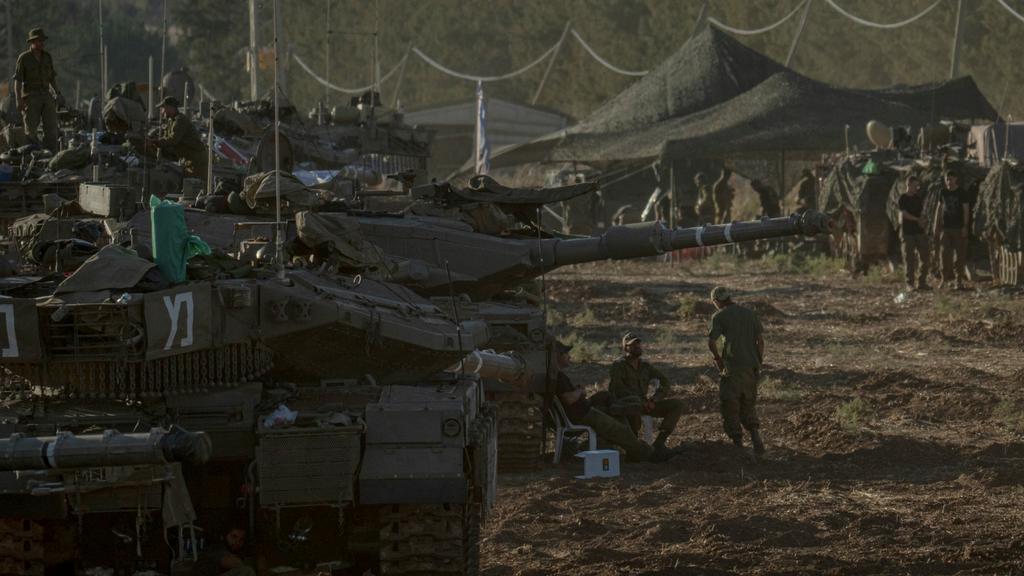
| |
Israeli tanks gather by the Israeli - Lebanese border. Picture: Getty Images.
|
|
Israel at war: Israel Security Cabinet approves ground invasion, US confirms 'limited incursions'
The Australian
Liam Mendes and Anne Barrowclough, Agency writers
Tuesday October 1 2024
The Israeli Security Cabinet has approved a ground invasion of Lebanon, as the US confirms limited incursions had already begun. Israeli media reported the cabinet approved boots on the ground, as the Israeli military told journalists not to report on troops movements. Israeli officials “have informed us that they are currently conducting… limited operations targeting Hezbollah infrastructure near the border”, US State Department spokesman Matthew Miller told journalists.
Amid reports the operations were a precursor to a full ground invasion, Israeli Defence Forces spokesman Daniel Hagari said on X: “In recent hours there have been many reports and rumors about IDF activity on the Lebanese border. We ask that no reports be circulated about the activities of the forces.”
Israel vowed to keep fighting Hezbollah and sealed part of the border after killing the Iran-backed militants’ leader Hassan Nasrallah. Israel’s Defence Minister Yoav Gallant warned the battle was not over even after the massive Friday strike on Beirut that killed Nasrallah, dealing the group a seismic blow.
World leaders have urged diplomacy and de-escalation, with United Nations Secretary-General Antonio Guterres’s spokesman Stephane Dujarric saying: “We do not want any sort of ground invasion.” Hezbollah fighters were “ready if Israel decides to enter by land”, deputy leader Naim Qassem said in a first televised address since Nasrallah’s death. United Nations peacekeepers in Lebanon were no longer able to conduct patrols “given the intensity of the rockets going back and forth”, Dujarric said.
Israeli Prime Minister Benjamin Netanyahu declared at a government meeting his nation was “in a war for our very existence. We will unite, go hand-in-hand and defeat our enemies,” he said on the eve of Rosh Hashanah, the Jewish New Year holiday. “We face major challenges. We will face them together and we will do the work that the people of Israel, and the generations of the people of Israel, expect that we will do.
He commended the commanders and soldiers of the IDF and security services, praising them for “striking our enemies” and “enabling our people to stand tall with pride. I would like to stand by our heroic soldiers, conscripts and reservists. While we celebrate the new year, may it be a good one, they will continue to defend our country with that same dedication, sacrifice and heroism that they have shown throughout the past year,” he said.
He also paid tribute to the hostages, declaring the nation would not rest until they are returned home. “Finally, I would like to thank all citizens of Israel: The reservists’ wives, the mothers and fathers of our fighters, and the children, for being steadfast throughout such a long period,” he said.
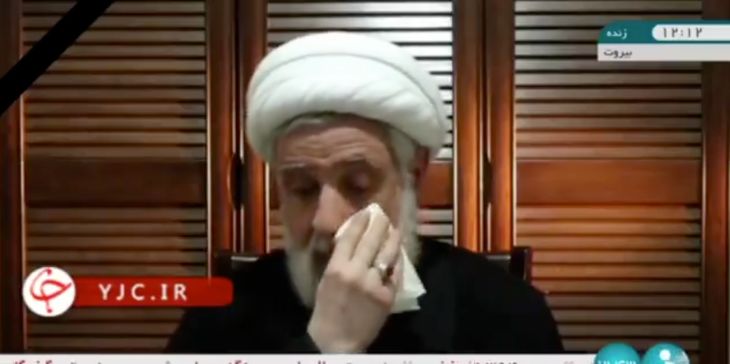
| |
Sheikh Naim Qassem, acting leader of Hezbollah.
|
|
The acting leader of Hezbollah insisted his organisation is ready for any potential ground operation by Israeli troops in a speech made around nine hours before Israel launched a limited operation in southern Lebanon. In the recorded speech on Monday afternoon local time, Sheikh Naim Qassem continued to pledge support for Gaza and committed to defending Lebanon.
“We will face any possibility and we are ready if the Israelis decide to enter by land and the resistance forces are ready for a ground confrontation and a ground battle,” Qassem said during his speech, during which he had to wipe sweat off his face. “We are prepared, and we are ready, and with God’s support and confidence in God, we are confident that the Israeli enemy will not achieve its objectives and we will be victorious after this battle.”
It was reported late Monday evening Israeli ground forces began operations inside Lebanese territory, with the Lebanese army retreating several kilometers. The Wall Street Journal had previously reported Israeli special forces had already launched small raids into Lebanon in recent months.
“Despite the losses of its commanders, the attacks against civilians throughout Lebanon, and great sacrifices, we will not budge from our position,” Qassem said in a speech reportedly made from a secret location in Beirut. “We will continue to support Gaza and to defend Lebanon,” he said.
Amir Avivi, a former senior Israeli military official who continues to be briefed by the defence establishment, told the Wall Street Journal an invasion was imminent. “The IDF has made a lot of preparations for a ground incursion,” he said. “Overall, this always includes special operations. This is part of the process.”
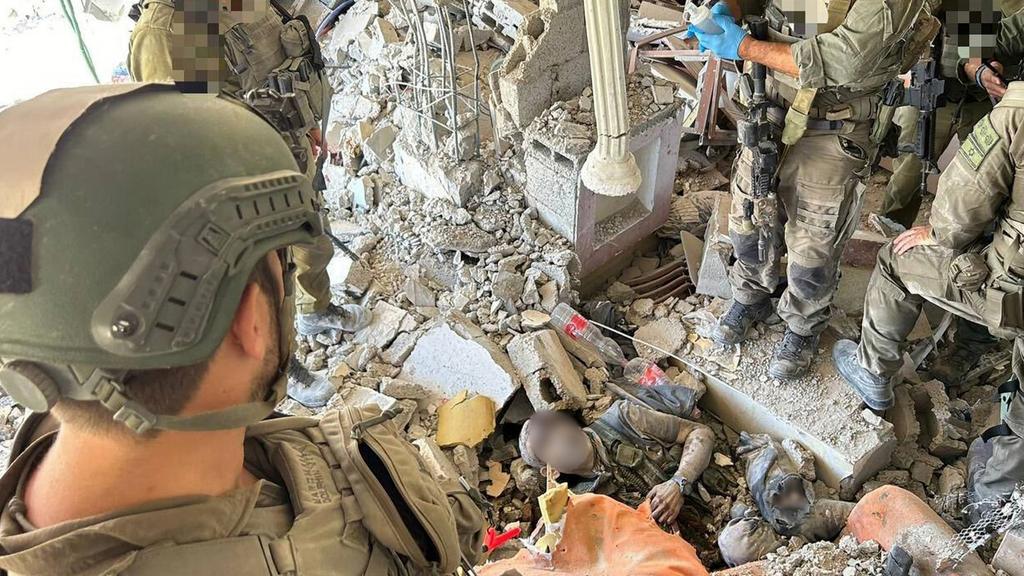
| |
Israel Defence Forces troops surround the body of Hamas terror chief Yahya Sinwar in Gaza on Thursday. Picture: IDF
|
|
The elimination of Israel’s Enemy No. 1 Yahya Sinwar
Weekend Australian
Ben Packham
Saturday October 19 2024
The death of October 7 mastermind Yahya Sinwar has left Hamas leaderless and in disarray, raising hopes of an end to the war in Gaza, as Israel warns the terrorist group’s remaining fighters to release their hostages or face the same fate. Israeli Prime Minister Benjamin Netanyahu said the Hamas chief’s death marked “the beginning of the end” of the conflict, but warned his country’s mission was not yet complete.
As world leaders held their breath at the prospect of a ceasefire, Mr Netanyahu, in a grim video message, offered the terrorists still holding more than 100 kidnapped Israelis a chance to save themselves if they laid down their arms and walked away. But he warned “those who harm our hostages, his blood is on his head and we will settle accounts with him”.
Joe Biden and Kamala Harris hailed Sinwar’s death, urging Israel to take the opportunity to bring the war to a close. “Now is the time to move on,” the US President said. “It’s time for this war to end and bring these hostages home.”
Israel had waged a massive manhunt for Sinwar, who ordered Hamas’s October 7 attack on the Jewish state that killed more than 1200 people and led to 250 hostages being seized. But his death came by chance when a unit of trainee Israeli squad commanders opened fire on three suspicious figures in Rafah on Wednesday. His identity only became apparent a day later with an announcement made about 4am (AEDT) on Friday.
An Israeli tank shelled two buildings where the figures took refuge, taking out the man later identified as Sinwar after he threw a piece of wood at a drone sent in to investigate. Edited footage from the drone showed the terrorist leader’s final moments, sitting in a chair shrouded in a green keffiyah and covered in dust before lashing out at the unmanned aircraft.
Israeli soldiers found his body in a pile of rubble with half his head caved in, immediately noting the resemblance to Sinwar. They prised open his mouth with a stick, revealing his distinctive worn and chipped teeth. His identity was later confirmed with DNA and dental records.
His death represents Israel’s most devastating blow to the terrorist group since the start of the war, and follows its assassination of Hamas’s military chief Mohammed Deif in Gaza in July and its political chief Ismail Haniyeh weeks later in Tehran. The hunt has now intensified for the slain Hamas leader’s brother and potential successor, Muhammad.
The terrorist group’s sponsor, Iran, declared Yahya Sinwar a martyr, saying his death would strengthen the “spirit of resistance” against Israel. It said that unlike former Iraqi leader Saddam Hussein, who was dragged from an underground hole begging for mercy, Sinwar was killed “facing the enemy”. “He will become a model for the youth and children who will carry forward his path toward the liberation of Palestine,” Iran’s mission to the UN posted on X. Tehran’s comments came as it braced for an imminent strike on its military facilities in retaliation for Iran’s October 1 missile attack on the Jewish state, amid Israeli assurances to Washington that its response would spare the country’s nuclear and oil sites.
Hezbollah, whose leader Hassan Nasrallah was assassinated by Israel in Beirut weeks ago, vowed after Sinwar’s death to intensify its attacks on the Jewish state with precision-guided missiles.
The families of some of the kidnapped Israelis believed still to be held in Gaza said they feared their loved ones were now in even greater danger and it was time to do a deal to secure their freedom. Einav Zangauker, whose 24-year-old son was abducted by Hamas on October 7, issued a video appeal urging Mr Netanyahu to “bring them all back”. “We have settled the score with the chief murderer Sinwar,” Ms Zangauker said. “But now, more than ever, the lives of Matan, my son, and the other hostages, are in tangible danger.”
Anthony Albanese said Sinwar was an “enemy of peace-loving people everywhere”, and his killing could help bring peace to Gaza. “His death is a significant moment and can be a vital turning point in this devastating conflict,” the Prime Minister said. He reiterated his calls for a ceasefire and a two-state solution. Peter Dutton said it was a “great day” for the world, as his home affairs spokesman James Paterson declared Sinwar would still be alive if Israel had heeded the Albanese government’s demands months ago for an “immediate ceasefire”.
Mr Netanyahu told Israelis the country had fulfilled its vow to strike back at the architect of the worst massacre of Jewish people since the Holocaust. “Today, as we promised we would, we settled accounts with him,’’ he said. “Today, evil suffered a heavy blow, but our mission is not yet completed.” Addressing Palestinians in Gaza, the Israeli Prime Minister said Sinwar had “destroyed” their lives.
“He told you he was a lion but in practice, he hid in a dark tunnel and was eliminated when he fled in a panic from our soldiers,” Mr Netanyahu said. He said Hamas’s leaders were “fleeing” and would be eliminated, and Gaza would “finally be free of its tyranny. I say to all those who are holding our hostages: those who put down their weapons and leave our hostages, we will allow them to come out and live,” he said. In a separate English language video pitched at international leaders who had long pushed for a ceasefire, the Israeli Prime Minister declared: “This war can end tomorrow. It can end if Hamas lays down its arms and returns our hostages.”
After months of tension between Mr Biden and Mr Netanyahu, the US President called the Israeli Prime Minister to congratulate him on the killing of the terrorist chief, saying Sinwar had “a lot of blood on his hands – American blood, Israeli blood, and others”. He said it was time to bring home the hostages, and he hoped a ceasefire was possible. The US Vice President said “justice has been served”, and the “entire world” was now better off. “This moment gives us an opportunity to finally end the war in Gaza, and it must end such that Israel is secure, the hostages are released, the suffering in Gaza ends, and the Palestinian people can realise their right to dignity, security, freedom, and self-determination.” Ms Harris said.
Israel Launches Airstrikes Against Iran
The Australian
Carrie Keller-Lynn, Rory Jones and Dov Lieber
also Wall Street Journal
Saturday October 26 2024
Shortly before 2am on Saturday in Israel, airmen and women wearing bomber jackets bearing the Star of David climbed into the cockpits of about 100 jet fighters, spy planes and refuelling aircraft at an Israeli military base. They were following commands from an underground bunker known as the pit.
Israel’s wartime leaders, who were gathered in the bowels of the military headquarters in Tel Aviv, had just given the green light for the largest attack against Iran in Israel’s history — and its most politically perilous. They called the operation “Days of Repentance”. The assault was calibrated to punish Iran for an attack on Israel but aimed to avoid setting off a full-scale war between the two foes involving American forces and other countries in the region. The attack steered clear of the oil and nuclear facilities that Iran had warned would prompt a retaliation, and appeared to heed the caution urged by US officials.
The US was informed by Israel hours ahead of the attack and didn’t participate, US officials said. Prime Minister Benjamin Netanyahu discussed Israel’s plans for the strike with President Biden on a call earlier this month, a US official said. After the attack began, Defense Secretary Lloyd Austin spoke briefly by phone with Israeli Defense Minister Yoav Gallant, US officials said.
The first crop of jet fighters destroyed air-defence batteries in Syria and Iraq, clearing the flight path for the second and third sorties to funnel through to Iran. Their exact route, which hasn’t been shared by Israel, appeared to dodge airspace in Jordan after the Arab nation said it wouldn’t be part of an attack on Iran. Most of the attacks were launched from outside Iranian airspace, said Amir Aviv, a former senior Israeli military official who is often briefed by the defence establishment. Iran said Israeli planes attacked from within Iraqi airspace, around 70 miles from its border.
At around 3.30am in Israel, the country’s military launched the second of at least three waves of attacks, according to people familiar with the matter. Israel’s strikes targeted Iranian facilities involved in the production of missiles like the cruise and ballistic missiles that targeted Israel twice this year.
One of Israel’s hits was at the sprawling Parchin military site, where Iran once worked on nuclear weapons capabilities, according to the UN atomic agency. Four buildings were hit there, including three solid-propellant facilities for missiles, said Fabian Hinz, research fellow at the International Institute for Strategic Studies focused on Iran’s missile program.
Just before sunrise, Israel’s military said its attack and retaliation were complete. The planes returned at the end of the four-hour assault with no losses.
Soon after, Iranian officials began privately telling Arab nations that the attack hit sites with great accuracy. In public, the regime said it led to “limited damage” and that Iran reserved the right to carry out a response at a time of its choosing. Four Iranian soldiers were killed in the attacks, Iran said.
Israeli officials said they hope that the attack would end a tit-for-tat exchange of fire with Iran and Israel’s military could now focus on its war goals fighting Hamas in Gaza and Lebanon’s Hezbollah, Iranian allies. Orion, the retired brigadier general, said the attack was calibrated but doesn’t mean the end of tensions with Iran. “It allows both sides to finish for now until the US elections, and then see where it goes,” he added.
A woman in central Tehran told The Wall Street Journal that she woke to the sound of continuous explosions Saturday. “My heart is jumping out of my chest,” she said. Iranian air defence authorities said their systems were firing in three locations around the capital.
Iran struck Israel on Oct. 1 to avenge the killings of the Hamas political leader, Ismail Haniyeh, in Tehran, and the Hezbollah leader, Hassan Nasrallah, in Beirut, launching about 180 ballistic missiles. In recent conversations with Arab governments, Iran’s foreign minister said his country doesn’t want a wider war and suggested Tehran could absorb an Israeli retaliatory strike without escalating if it targeted military sites rather than sensitive oil or nuclear facilities, Arab officials said.
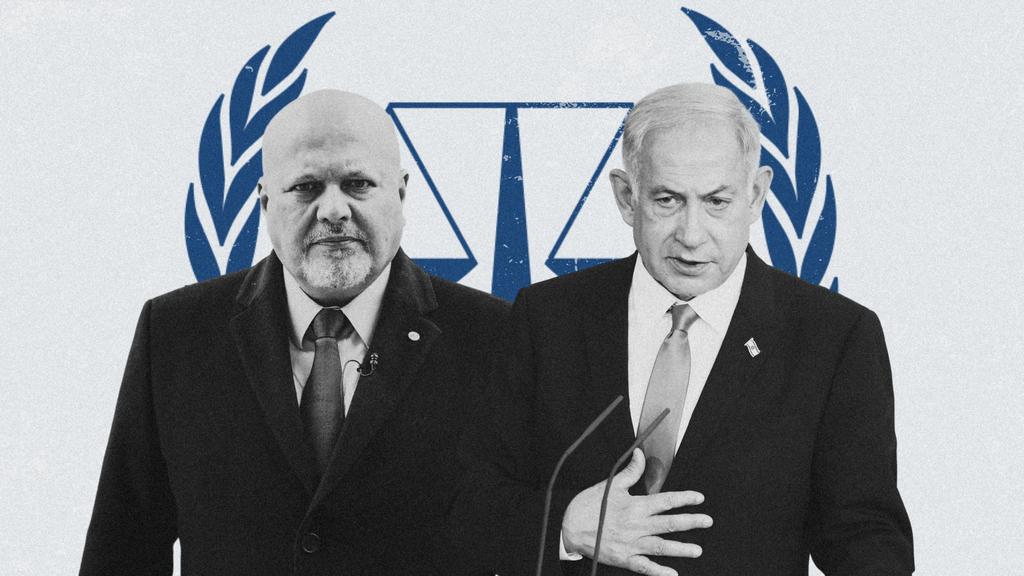
| ICC prosecutor Karim Khan
The government should make it clear that it will not arrest Benjamin Netanyahu or his former defence minister, Yoav Gallant, when they next visit Australia.
|
|
This ICC ruling is the government’s worst nightmare
Cameron Stewart, The Australian
Saturday November 23 2024
There now seems little doubt the Albanese government believes Israeli Prime Minister Benjamin Netanyhau is probably a war criminal.
How else does one interpret the studied silence by Foreign Minister Penny Wong over the International Criminal Court’s issuing of arrest warrants Thursday Nov 21 at The Hague for the Israeli leader and his former defence minister for alleged crimes against humanity?
Why did Wong choose not to utter words similar to those of the leader of our closest ally, with Joe Biden describing the ICC’s decision as “outrageous”, adding that “whatever the ICC might imply, there is no equivalence – none – between Israel and Hamas”. And why did we not, at the very least, get clarification from Wong that if Netanyahu were to visit Australia, we would not follow the ICC’s call to arrest the leader of a democracy and an ally fighting a war against terrorists who attacked it?
Instead, Wong issued only an opaque motherhood statement saying “Australia respects the independence of the ICC’ and calling on “all parties” to comply with international humanitarian law. Let’s be frank here, this is a government pretending to sit on the fence when it has already fallen off and landed with a thud on the opposite side to Israel.
The ICC ruling is the government’s worst nightmare because it pits support for Israel’s right to defend itself against the support for the findings of an institution which Australia, along with 124 counties, has signed up to. From Wong’s initial non-comment, it seems as if the ICC has won that fight, although the government will not say so in as many words. Instead the government is “respectful” of the fact a court with a clear political bias against Israel is lumping its democratically elected leader in with other ICC targets like Russia’s Vladimir Putin, who invaded Ukraine without provocation, and Sudanese leader Omar al-Bashir, who carried out relentless ethnic cleansing.
The fundamental problem with the ICC’s ruling is that it chooses to label as “war crimes” the Israeli government’s actions on the battlefield in a hot war against a terrorist organisation that slaughtered its own people.
Israel's Prime Minister Benjamin Netanyahu said on Thursday (November 21) a decision by the International Criminal Court to issue a warrant to arrest him for alleged war crimes was "antisemitic"
That is not to say that Israel has not made mistakes in its conduct of this war. It has. After 1200 of its own people were killed, Israel adopted more hardline battlefield rules in the targeting of Hamas fighters, choosing bombing targets in Gaza that had a higher civilian-to-Hamas ratio than it had accepted in previous operations. This meant Israel’s justifiable targeting of Hamas fighters led to more civilian deaths than it should have. It is fair to criticise Israel for this.
Israel’s second wartime mistake has been its continued reluctance to let in more aid to Gaza when it was clear that a humanitarian crisis was unfolding. For too long Israel used the excuse Hamas might steal some of the aid to justify restricting the more urgent needs of ordinary Gazans. Once again, it is fair to criticise Israel for this.
But to suggest, as the ICC does, that these mistakes and excesses, made during a hot conflict which was not of Israel’s choosing, amount to war crimes is, as Biden put it, “outrageous”. Even the ICC admits that Israel was not seeking to eradicate Gazans in some sort of planned genocide, as Israel critics often claim. The court gives no weight to the fact Israel’s conflict against Hamas was provoked by Hamas’ acts of October 7 last year. It makes no mention of the fact that Israel’s pursuit of Hamas is being made in self-defence and with the laudable aim of preventing another such attack.
It takes no account of the fact that, as unpalatable as it may be, there were always going to be heavy civilian casualties when fighting an enemy like Hamas which willingly sacrifices the lives of its own people by operating under hospitals, schools and apartment buildings. Given these oversights, it’s hard not to conclude that the ICC has a fundamental anti-Israeli bias.
The government should condemn this decision and make it clear that it will not arrest Netanyahu or his former defence minister, Yoav Gallant, when they next visit Australia.
Click here for news since November 27 2024
Go back to top
** End of article













